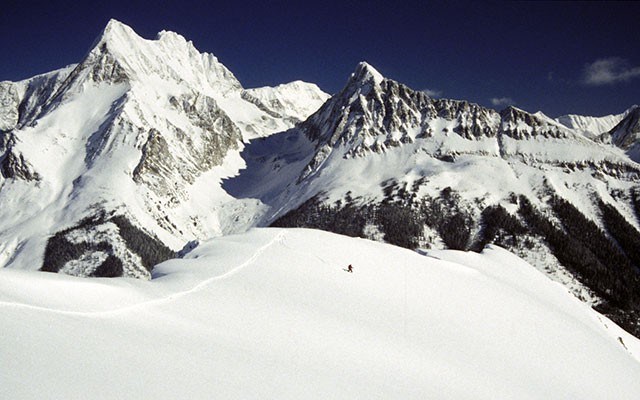Developers behind the controversial Jumbo Glacier Resort in southeastern B.C. have come up against yet another hurdle after they were told to halt construction on two buildings that aren't in compliance with safety guidelines.
The B.C. Environmental Assessment Office (EAO) has found that a day lodge and a service building at the site of the proposed ski resort located west of Invermere are in an avalanche zone.
An April 24 letter from the office to Glacier Resorts co-owner Oberto Oberti stated that the two buildings were not in compliance with a condition of the project's environmental certificate requiring all commercial and residential buildings be located "completely outside the avalanche hazard area."
As a result, Glacier Resorts must cease construction on both structures, although work can continue in areas outside of the avalanche path. The province has asked developers to amend their plans within a "reasonable timeline" or risk an order that could force the company to remove the two structures.
While environmental groups are calling it a major blow to a project that has been in the making for more than 20 years, developer Tommaso Oberti believes it's only a minor setback.
"The reality is, in terms of hiccups, this is very minor compared to obstacles that the project has overcome in the past," he said. "We know how it can be resolved and it will be resolved."
Oberti said Glacier Resorts would ask for an amendment that considers the Canadian Avalanche Association's updated mapping guidelines.
"The commitment is very black and white and was developed in the '90s when avalanche mapping was done a little bit differently than it is today," said Oberti. "Basically what needs to be done at this point — because we don't want to move the buildings — is ask for an amendment to the condition to reflect present-day standards."
But the insistence on an amendment is yet another example of the developers not following the province's guidelines, according to David Reid, executive director of environmental consultant firm, the West Kootenay Community EcoSociety.
"The point is that the regulation is there to protect the public and the environment and they ignored it," Reid said. "I think that raises serious questions about their willingness and their ability to comply with the rest of the environmental certificate.
"In my view, and in many people's view, this should be the end of the road for this project."
Jumbo's proponents are also awaiting word from environment minister Mary Polak on whether preliminary building of the day lodge constitutes "substantial construction," a decision that leaves the project's future hanging in the balance.
With just days before Jumbo's environmental certificate was set to expire in October and grind the project to a halt, Glacier Resorts poured the concrete for the lodge's foundation, which opponents have argued did not meet the standard of a substantial start to construction.
"The developer's ill-conceived last-minute attempt to create a footprint in the Jumbo Valley has failed," wrote John Bergenske, conservation director of environmental group Wildsight, in a statement. "There should be no question in the minds of reasonable people that the project should not have been started. The little activity that has taken place will require remediation measures."
Since the multi-billion dollar project was originally approved by the B.C. Government in 2012, it has faced numerous obstacles both in court and out.
Reid and the West Kootenay Community EcoSociety have also challenged the constitutionality of the Jumbo Glacier Resort Municipality, which was formed by the province in 2012 with the appointment of a mayor and two councillors despite the resort having no citizens.
The move was done to give the municipality "enduring certainty" to questions around the resort's land use, said Jumbo Mayor Greg Deck in a February email to Pique.
"I think (the municipality) is a very efficient way to administer the creation and subsequent operation of the community, and that efficiency is in the best interests of all the eventual taxpayers," he added at the time.
Jumbo has been billed as Canada's first year-round ski resort, and, once completed, could include up to 23 lifts, a 3,000-metre-high gondola and a ski village with more than 6,000 bed units.




